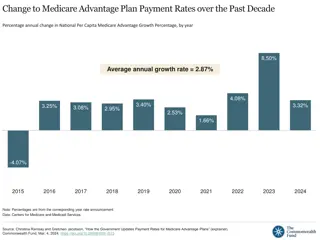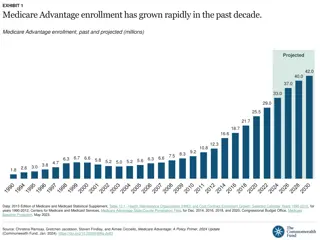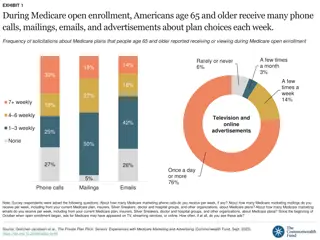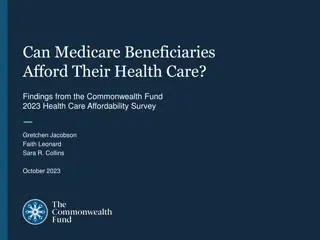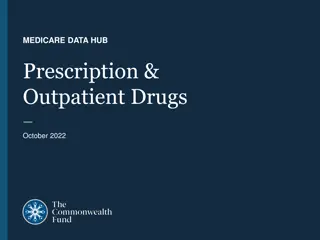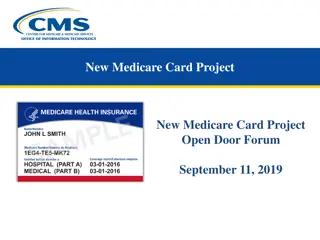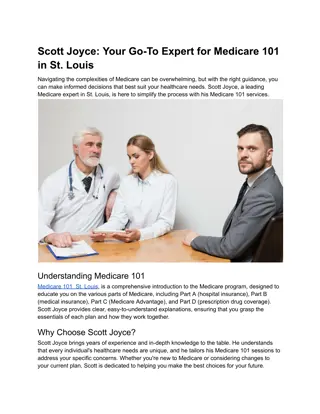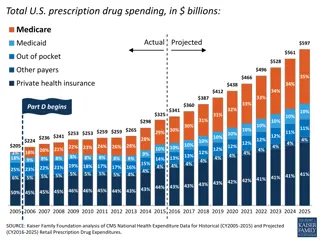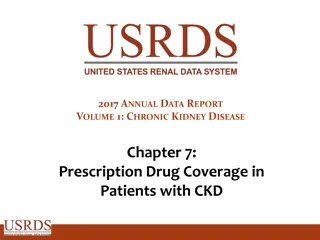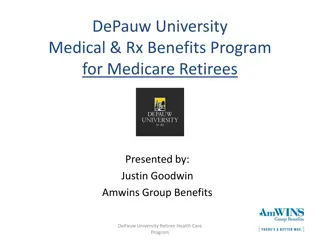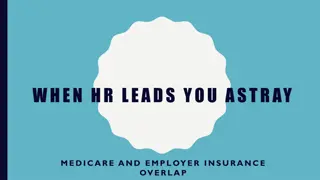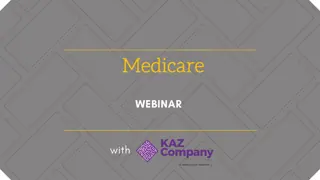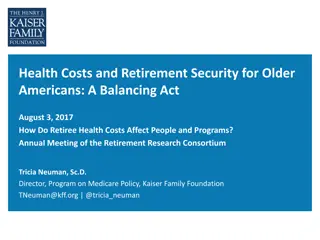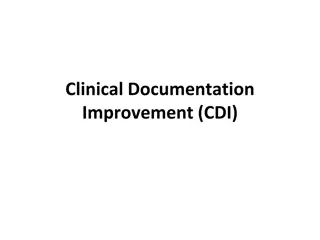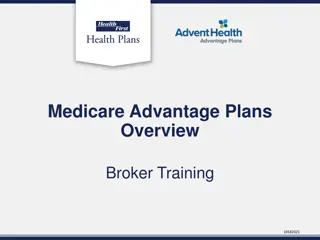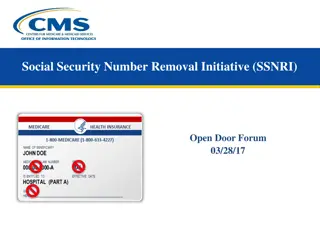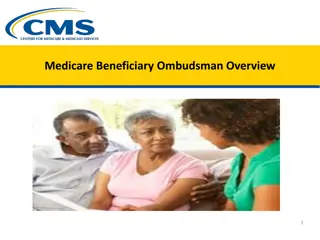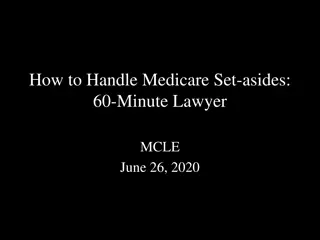
Medicare, Social Security & HSAs for U.S. Employees
Explore the key aspects of Medicare, Social Security, and Health Savings Accounts (HSAs) through this informative content. Learn about Medicare eligibility, Parts A and B, coverage details, costs, enrollment periods, and more. Discover how these benefits impact U.S. employees and their families.
Download Presentation

Please find below an Image/Link to download the presentation.
The content on the website is provided AS IS for your information and personal use only. It may not be sold, licensed, or shared on other websites without obtaining consent from the author. If you encounter any issues during the download, it is possible that the publisher has removed the file from their server.
You are allowed to download the files provided on this website for personal or commercial use, subject to the condition that they are used lawfully. All files are the property of their respective owners.
The content on the website is provided AS IS for your information and personal use only. It may not be sold, licensed, or shared on other websites without obtaining consent from the author.
E N D
Presentation Transcript
2019 Medicare, Social Security & HSAs U.S. Employees Benefits Meeting 1 1
Medicare, Social Security & HSAs Today s Discussion Medicare Basics What is Medicare? Medicare Parts A & B Medicare Eligibility Medicare & Health Savings Account (HSA) Rules Currently enrolled in Medicare and/or receiving Social Security benefits Spouse is enrolled in Medicare Receiving Medicare due to a disability Not yet Medicare eligible Important Contact Information 2
Medicare, Social Security & HSAs What is Medicare? Health insurance for the following: People 65 or older People under 65 with certain disabilities People of any age with End-Stage Renal Disease (ESRD) (permanent kidney failure requiring dialysis or a kidney transplant) The different parts of Medicare help cover specific services Part A Hospital insurance Part B Medical insurance Part C Medical Medicare Advantage Plans (like an HMO or PPO) plans run by Medicare-approved private insurance companies. These plans include Part A, Part B, and usually other coverage Part D Part D Prescription Drug coverage 3
Medicare, Social Security & HSAs Medicare Parts A & B Part A: How much does it cost? Most people don t pay a Part A premium, because they paid Medicare taxes while employed How do I Get Part A? Most people automatically get Part A, upon reaching age of retirement or age 65, whichever is later If you collect Social Security you automatically receive Part A Part B: How much does it cost? If you have Part B, you pay a Part B premium each month, this amount is deducted from your monthly Social Security benefits. Most people will pay the standard premium amount. The standard premium is $135.50 per month for 2019. If your income is above a certain amount, the premium may be more. How Do I Get Part B? If you collect Social Security you automatically receive Part B If you do NOT want Part B, you must dis-enroll instructions on your Medicare card 4
Medicare, Social Security & HSAs Eligibility When can you sign up for Part A and Part B? When you are first eligible You have a 7-month period that begins 3 months before you turn 65, includes the month you turn 65, and ends 3 months after you turn 65 Between January 1 March 31 each year If you didn t sign up when first eligible, you can sign up during this Open Enrollment period If you qualify for Special Enrollment period If your coverage ends under a group plan; you have 8 months to enroll If you plan to continue working past your 65th birthday, you can delay enrollment in Medicare until you retire When does my coverage start for Part A and B? If you enroll during 3 months before you turn 65 coverage starts on the 1st day of your birthday month If you enroll the month you turn 65 coverage starts 1 month after you sign up If you enroll 1, 2, or 3 months after you turn 65 coverage starts 2 or 3 months after you sign up If you enroll during Open Enrollment period (January 1 March 31) coverage starts July 1 5
Medicare, Social Security & HSAs Eligibility - Definitions Eligible for Medicare Means that you ve met the requirements to qualify for Medicare Part A hospital insurance - in other words, you or your spouse has enough Social Security work credits - but you haven t yet applied for it Entitled to Medicare Means that you re eligible, you ve filed an application to receive Medicare Part A or have been approved automatically, and your name is already in the system - or that the application has been processed and you ve been sent a Medicare card showing the date your coverage starts 6
Medicare, Social Security & HSAs Medicare and Health Savings Accounts Rules You can enroll in the Qualified High Deductible Health Plan regardless of Medicare eligibility, however you are ineligible to open and contribute to a Health Savings Account if you are enrolled in any aspect of Medicare BMC s HSA plan is a Qualified High Deductible Health Plan According to the IRS and Center for Medicare Services (CMS) people with Medicare are not allowed to put money into an HSA. This is because you cannot have any health coverage other than an QHDHP if you are putting money into an HSA However, remember you may withdraw money from your HSA after you enroll in Medicare to help pay for medical expenses (deductibles, premiums, copays or coinsurances). If you use the account for qualified medical expenses, it will continue to be tax-free 7
Medicare, Social Security & HSAs Medicare and Health Savings Accounts Rules You cannot decline Medicare Part A if you are receiving Social Security benefits If you re eligible for Medicare but have not filed an application for either Social Security retirement benefits or Medicare, you do not need to do anything. You can open/contribute to the HSA and postpone applying for Social Security and Medicare until you stop working. There is no penalty for this delay as long as you re covered by an employer s health plan If you re entitled to Medicare because you signed up for Part A at age 65 or later, but have not yet applied forSocial Security retirement benefits, you can withdraw your application for Part A. (To do so, contact Social Security Administration at 1- 800-772-1213) There are no penalties or repercussions and you are free to reapply for Part A at a future date. (If any claims have been paid by Medicare part A on your behalf, you would be required to pay those back.) 8
Medicare, Social Security & HSAs Medicare and Health Savings Accounts Rules If you have applied for, or are receiving, Social Security benefits - which automatically entitles you to Part A - you cannot open/contribute to an HSA The only way you could opt out of Part A is to pay back to the government all the money you ve received in Social Security payments, plus everything Medicare has spent on your medical claims. You must repay these amounts before your application to drop out of Part A can be processed. If you take this action, you re no longer entitled to Social Security or Medicare - but you can reapply for both in the future Contact the Social Security Administration to start this process 9
Medicare, Social Security & HSAs Medicare and Health Savings Accounts Rules Beginning the first month you enroll in Medicare your HSA contribution limit is zero. If you enroll in Medicare during the year, your HSA contribution limit is pro-rated. For example: You turned age 65 in July 2017 and enrolled in Medicare. You were enrolled in self-only cover-age and were eligible for an additional contribution of $1,000. Your contribution limit for 2017 would have been $2,200 ($4,400 6 12) This rule applies to periods of retroactive Medicare coverage, so if you delayed enrolling in or applying to Medicare and later your enrollment is back dated, any contributions made during the period of retroactive coverage are considered excess. If you are over age 65 you need to be sure to stop all contributions to your HSA up to 6 months before you collect Social Security. When you apply for Social Security, Medicare Part A will be retroactive for up to 6 months (as long as you were eligible for Medicare during those 6 months). If you do not stop contributing to the HSA 6 months before you apply for Social Security, you may have a tax penalty for the excess contributions. The penalty is because you were not supposed to put money into your HSA while you had Medicare. 10
Medicare, Social Security & HSAs Receiving Medicare due to disability You are ineligible to open a Health Savings Account, because you have Medicare The only way to open an HSA is to opt out of Part A: Repay Social Security for all the disability payments you ve received, even if you ve never used Medicare for medical services Repay Medicare for any services that you have used 11
Medicare, Social Security & HSAs Spouse is enrolled in Medicare As the employee, you are the HSA accountholder, therefore you are eligible to open and contribute to a Health Savings Account regardless if your spouse is enrolled inMedicare If your spouse is covered under Medicare and you are on the plan as an employee only, you can only contribute up to the single maximum contribution for 2019 of $3,500 each year (combined employee and employer contribution). An additional $1,000 catch-up contribution can be made if you are aged 55 or older. However, if your spouse is covered under the BMC plan AND by Medicare you can contribute up to thefamily maximum of $7,000 for 2019 12
Medicare, Social Security & HSAs Not Medicare Eligible yet, but close! You can open and contribute up to the maximum + $1,000 catch-up contribution to a Health Savings Account The month you enroll in Medicare (typically the month of your 65th birthday) you must stop contributing to your HSA Since changes to your HSA are effective the 1st of the following month, you will need make changes to stop your contributions the month prior to your 65th birthday If you plan delay your application for Social Security benefits past age 65, remember that Medicare coverage will be retroactive up to 6 months prior to the date you become entitled to Social Security. This means you need to stop your HSA contributions up to 7 months prior to receiving your SS benefits. Whether you should delay enrollment in Medicare so you can continue contributing to your HSA depends on your circumstances. If you wish to decline Medicare, you can do so and enroll later when you lose your current employer coverage this is considered a Qualifying Event At time of retirement you would need to call your local Social Security office 13
Medicare, Social Security & HSAs Important Contact Information Center for Medicare Services (CMS) www.cms.gov Medicare 1-800-633-4227 www.medicare.gov Social Security Administration 1-800-772-1213 www.ssa.gov AARP FAQ http://www.aarp.org/health/medicare-insurance/info-04-2009/ask_ms_medicare_question_53.html IRS Pub 969 HSAs & Other Tax-Favored Health Plans https://www.irs.gov/pub/irs-pdf/p969.pdf Disclaimer: This presentation is for informational purposes only. Please consult your financial or tax advisor if you have any questions. You may also contact the Social Security Administration or Center for Medicare Services 14
2019 Annual Enrollment Oct. 29 Nov. 9 Thank You 15


